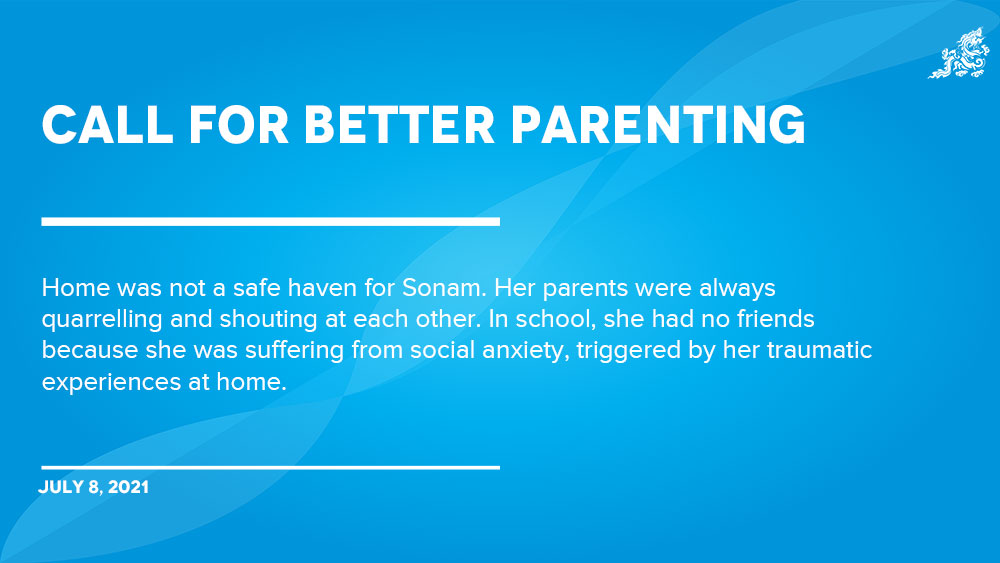Chhimi Dema and Dechen C Dendup
Home was not a safe haven for Sonam.
Her parents were always quarrelling and shouting at each other.
In school, she had no friends because she was suffering from social anxiety, triggered by her traumatic experiences at home.
“My parents always yelled at me for no reason. They vented their work frustrations on me,” Sonam said.
With no parental love or support, at the age of 11 she tried killing herself.
Singing, journaling and collecting motivational quotes helped her survive the rough days, she said.
Now 21, she lives with her mother. She could not complete her university degree because of financial constraints and the pandemic situation in India.
Sonam said: “It’s been years for me battling with depression.”
Parents, Sonam said, should shower their children with love and affection and support their children’s dreams. “My parents never allowed me to express myself or tried to know me.”
Growing up is the hardest thing, Sonam said.
While some youth are able to cope with the lack of parental support, some become problematic in schools and loses focus in their lives.
“Parents play a crucial role in the lives of the youth,” a school principal in Thimphu said.
He said that students who got the right attention from their parents were performing well in the school. “Some parents with their work are not able to give the required amount of time and attention to their children.”
He added that some parents were defensive about their children’s actions saying that their children must have been peer pressured to fight or quarrel.
Schools have discipline policies, dos and don’ts in the school, the principal said. “Parents’ guidance at home and schools’ effort to inculcate values might help the youth to make informed decisions in their lives.”
Youth are the country’s asset, he said, but they’re only a few working to make their lives better.
World Health Organisation (WHO) identifies poor monitoring and supervision of children by parents, harsh, lax or inconsistent parental disciplinary practices, and a low level of attachment between parents and children as some risk factors within close relationships for youth violence.
The principal said that youth violence was also caused because the youths are socially disconnected. He said that youth confine themselves and lacks social skills that it gets hard for them to adjust with other people.
“When we inquired students on why they fought, they said that the other person stared at them,” he said.
Even the video of two boys kicking one of their mates that recently went viral on social media was because a boy in a school in Thimphu glared at the victim. The victim bothered the boy and that was when the boy asked his friends in Changzamtog school to beat the victim.
A teacher in Thimphu said that there were many similar cases of bullying or fights that were not reported to the police or the school management. But the case of the Changzamtog school got attention because it went viral on social media, she said.
Dema, a teacher, said that some students who lacked support from their parents or had divorced parents were problematic in the school. She added that some fights in schools were started because the senior students thought they were superior to the junior students.
“Parents should make an effort to keep track of his or her children’s life in school and outside,” she said.
Leki Choden, a parent, said that she cannot even scold her children because she fears they would hurt themselves.
Tandin, a high school student, said that he hardly talks with his parents. He said that his father was drinking most days, and his mother came home late from work.
“Most days I lose the interest to study or do anything in life,” he said. “But I am working harder hoping that I would be able to make a difference in my life.”
WHO recommends youth violence prevention programmes to include life skills and social development programmes designed to help children and adolescents manage anger, resolve conflict, and develop the necessary social skills to solve problems.
Programmes that support parents and teach positive parenting skills, preschool programmes that provide children with academic and social skills at an early age, therapeutic approaches for youths at high risk of being involved in violence and community, and problem-oriented policing are recommended as some youth violence prevention programmes.
Edited by Jigme Wangchuk


